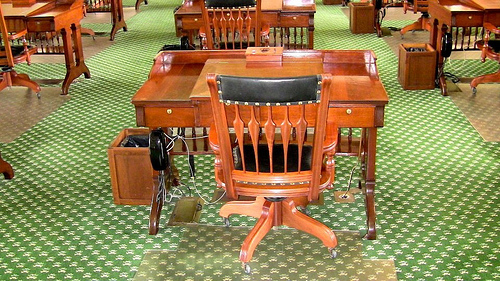On April 9, Texas senators heard Senate Bill-1575, one of five school choice bills before state lawmakers this spring.
Under the bill, sponsored by Sen. Donna Campbell (R-New Braunfels) and cosponsored by Sen. Ken Paxton (R-McKinney), the state would reimburse parents for private school tuition. Other Texas bills would let businesses write off donations to a nonprofit that grants K-12 scholarships.
Taxpayer Savings Grants
SB 1575 would authorize taxpayer savings grants, which reimburse parents who transfer their children to private schools with up to 60 percent of the state’s average per-pupil expenditure, roughly $5,100. The state would save the other 40 percent, roughly $3,400 per pupil.
Rep. Scott Turner (R-Frisco) is sponsoring the bill’s House companion, HB3497.
“Taxpayer Savings Grants give parents the opportunity to select the best school for their child while saving the state billions of dollars that can be reinvested in public schools or other priorities,” Campbell said in an email.
Tax Credits
Three bills—SB23, SB1015, and HB3245—propose education tax credits. Businesses would receive credits for donating to nonprofits that then award scholarships to students who want to attend private schools.
“The money is then not really flowing through the state. It ends up going to kids directly,” said Paxton, who is sponsoring SB1015 and cosponsoring SB23. “It ends up being totally about where the kids want to go. The state isn’t directing the dollars. It seems like a cleaner, easier approach, and to me, it’s an easier sell.”
SB23 would require scholarship organizations to give first priority to students already receiving scholarships and their siblings, and second priority to students attending low-performing schools. The scholarships may not exceed 80 percent of the state’s average per-pupil spending, or $6,800.
Paxton said the two Senate bills are “pretty much the same thing,” so SB-1015 would probably not go to a vote since SB23 is sponsored by Sen. Dan Patrick (R-Houston), the education committee chair.
Patrick did not return calls for comment.
The House tax-credit bill, sponsored by Rep. Bill Callegari (R-Katy), would permit donations to fund scholarships worth up to 60 percent of the average public school per-pupil cost.
“It doesn’t detract from the property taxes of the school district, and I think that’s very important,” Callegari said. “For the most part, I do support public schools, so it’s not an anti-school issue at all. Certain kids have some difficulties, and the ability to get a fresh start if needed or to just be in a different atmosphere is good for some kids, and we should have that opportunity available.”
The Right Time
School choice has traditionally been a tough sell in Texas, said James Golsan, an education policy analyst for the Texas Public Policy Foundation.
“Texas has always been, by nature, conservative with a small ‘c.’ Anything that’s pretty aggressive reform, like school choice, is difficult to get moving, because we’re hesitant about radical change,” he said.
Texas allows 215 charter operators to run schools in the state. In 2011, 56,000 students sat on a charter school waiting list. By 2013, that number increased to 100,000, he said.
But the Texas legislature is changing, Paxton said. Since he joined the Senate in 2003, he’s seen a shift toward a more choice-friendly legislature, especially in the Senate and its education committee.
“Both [bills] are uphill battles at this point, because the education lobby is very powerful,” said Allan Parker, president of the Justice Foundation and coordinator of the Texas Savings Grant Coalition, “but there were over a million voters in Texas who voted for school choice in the Republican primary.… That’s giving a good push for school choice.”
‘Every Kid Is Different’
School choice helps ensure good schools because of a “bottom-up accountability driven by parents who can vote with their feet,” Golsan said.
“While we’ve got a lot of excellent public schools here, just because the school is physically close to the kid doesn’t mean the school will be best suited for the child,” he said. “Choice will level the playing field and give each student a shot at the best quality education they can get.”
School choice isn’t just about low-performing schools, Paxton said, because all students have different needs.
“For kids that want to do something different and for parents who want to do something different than what they’re at now, I’d like the opportunity to move their children to whatever’s best for them,” he said. “Every kid is different. Every situation is different. The dollars ought to flow with the parent and the kid, and not just the city they live in.”
‘A Life or Death Issue’
The added competition would encourage educators to improve schools, he said.
“Kids and parents should have choices, and these bills provide [that]. Competition … works in the private sector, and it works in education,” he said.
Improving education is “a life or death issue for many, many children,” Parker said.
“It’s not just a good idea. Children’s souls and lives are literally being lost in the quagmire of public education,” he said. “The only way to get any real change is by eliminating the barriers to entry and allowing new good schools to be created.”
Image Austinite cowboy.




